Learning how to monetize your blog and grow your brand is a formula bloggers around the globe are looking to figure out. Not everyone does.
Stacey Ferguson, created the BeBlogalicious conference in 2009 to inform and empower bloggers to monetize their online presence. Now in its 9th year, the conference attracts over 300 attendees and receives support from major sponsors including the likes of General Mills, Toyota, General Motors, Kia Motors, Coca-Cola and Cover Girl. The conference brings in over $2M in sponsorships.
It all appears effortless thanks to Stacey Ferguson, co-founder and chief curator and her team. But the effort starts nearly a year before attendees arrive requiring upfront payments of over $100,000. In order to bring on the level of sponsorship and secure the hotel partner the Blogalicious team puts forth upfront payments with no guarantees that people will show up. Every year is a gamble. But Ferguson is not afraid because she plans, prepares and promotes effectively. She’s a technology and advertising attorney by trade and regularly consults with entrepreneurs, startups and established brands on digital and brand strategy.
We caught up with the wife and mother of three ahead of her 9th conference in Miami to get more insight on what it takes to put on a conference at this level.
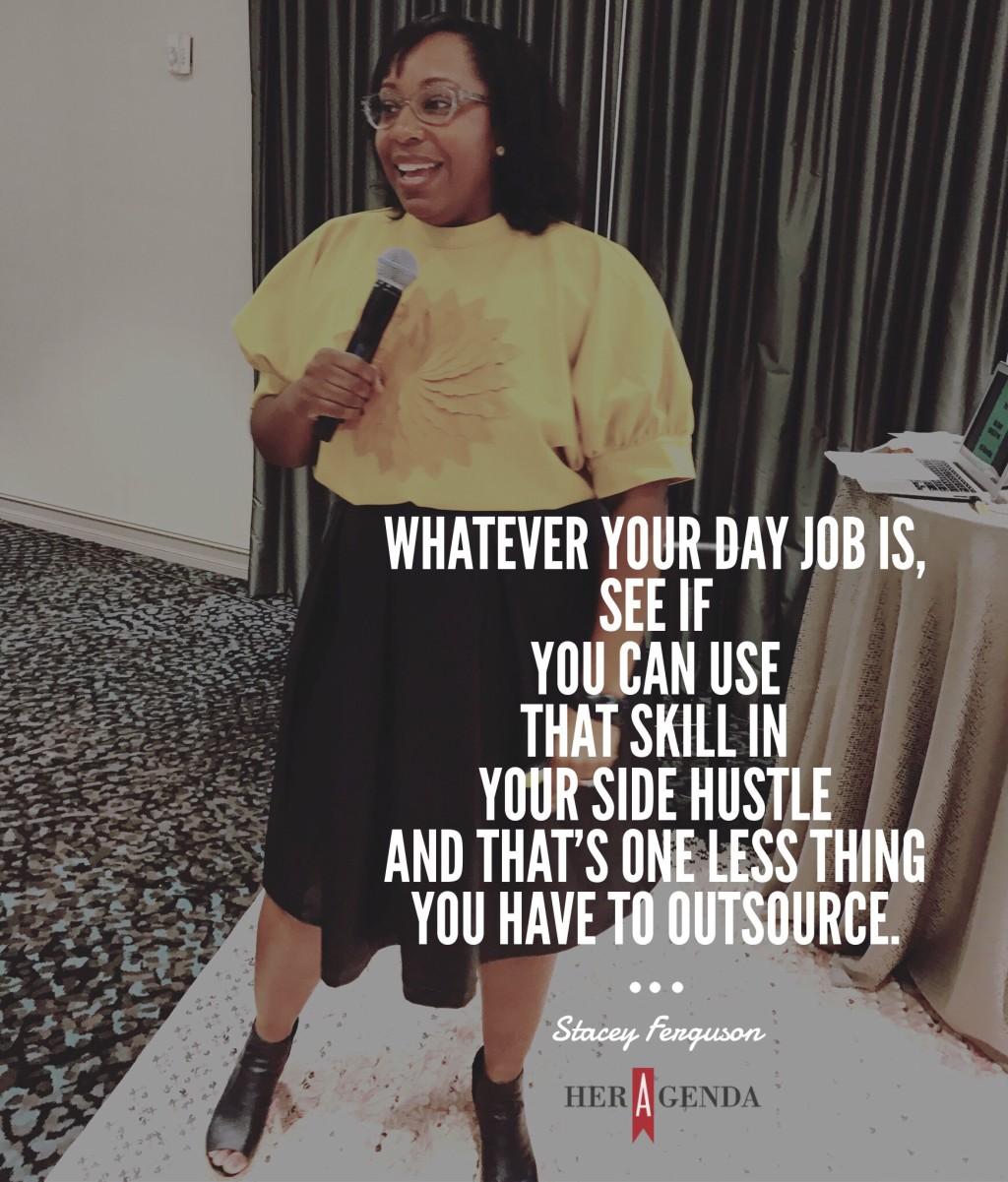
Her Agenda: In 2009, you were working at the FTC, and so what made you say ‘I’m going to start a blogging conference?’
Stacey Ferguson: Actually, in 2006, I had just had my second daughter—I have three children, and I started a mom blog with two friends I had gone to law school with. We were getting comments and we were like ‘oh, there’s kind of a community here, wouldn’t it be cool if all of our readers and people we read online got together in one room to meet one another, so we could see that women of color online were real and we would have a community?’ So that was the idea for the first Blogalicious. Three years after starting our blog we said let’s just do it. We were actually in Atlanta that first year and invited everyone literally by leaving comments on their blogs, by emailing them, and by tweeting. So we didn’t pay for any marketing or anything, and we had 177 people—I’ll always remember that number. And from then on, it was all she wrote, and we really thought it was going to be a one time thing. Like we’re going to do this one year; our web URL was literally www.blogaliciousweekend2009.blogspot.com. The people at the end of the first year they were like “well, where is it next year?” and we were like “next year?” and then here we are year [nine].
Her Agenda: Coming from a background in law, how did you gain credibility in the blogging world?
Stacey Ferguson: It was called mamalaw.com. I wrote about being a mom and a lawyer, and juggling that balance, and that’s when I was like ‘oh, this blogging thing is fun!’ and just kind of used that as an outlet.
Her Agenda: What’s one thing that a blog can do to stand out?
Stacey Ferguson: That’s a great question. This is an answer that you may not want to hear, but one thing you can do stand out is to be yourself. And what I mean by that is don’t try to start a blog because you read somebody else’s and thought you could do that. The copycat blog is never going to work.You have a special gift that only you know and only you can give to the world, so spend time with yourself to figure out what that is, and once you’ve got that make sure that is the focus. For example, because I love entertaining and parties and producing and all of that stuff, Life is the Party is my blog so no one’s going to do a lifestyle blog in that way, because that’s my personal motto and mission, to make everyone celebrate every day. Whatever that thing is for you, that’s what you lead with and that’s how you’ll stand out.
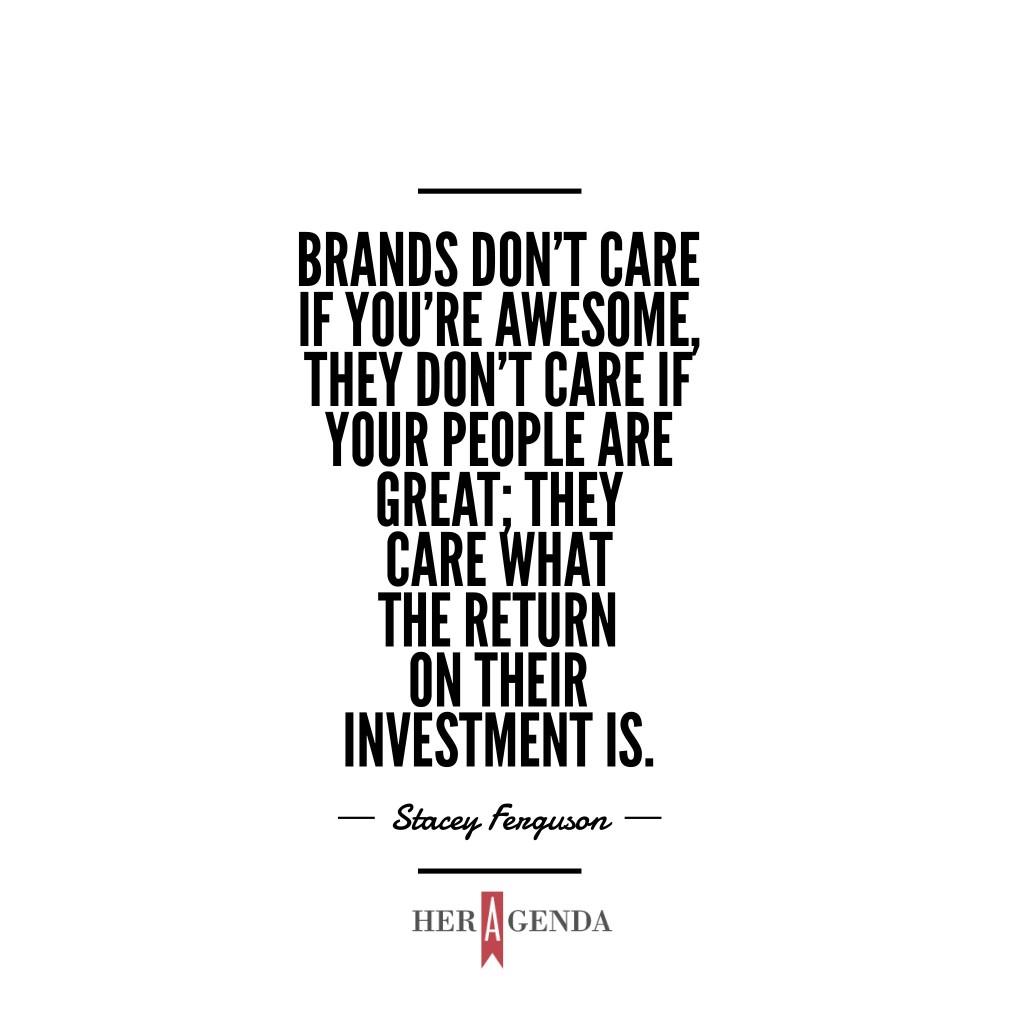
Her Agenda: When you were working in law, and you were also running your own blog, and running Blogalicious, what did you in the short term to make a plan to transition?
Stacey Ferguson: Excellent question, and I actually have five strategies because people ask me all the time; they’re like ‘Oh my gosh, you just up and quit your job!’ No. You can’t just up and quit, I do not recommend that.
First, like I said, I started blogging in 2006 and I had several other businesses that I tried. But then in 2009 when we had Blogalicious. So in 2009 we had the first [conference], because people came, because we were able to make a profit albeit small—I think it was $7,000, but it did show me that there was a business model that could be improved on and had potential and there was a community to serve. So my first recommendation is to test. Whatever you think you want to do, launch it! Test it out, because if it works great, you can build upon it and figure out how much earning potential there is. And if it doesn’t work out, great because now you know and you didn’t quit your job for something that wasn’t going to work.
The second thing is, I did Blogalicious for four years before transitioning out of practicing law. So it wasn’t just overnight, it was four long years of doing both; of going to work during the day, to coming home to three kids, cooking dinner, bath, bedtime, story, homework and then putting them to bed. And then from probably like 9 pm to 2 am, working on Blogalicious for four years. And then building it up every year, growing it, growing it, growing it so then after that I was like ‘okay, now it’s time.’
The third thing is, you have to prepare the people around you because entrepreneurship affects people around you no matter what. Whether it’s a spouse, children, parents, friends, family. So lots of conversation with my husband about how this will affect the family, tapping into our savings, all of that kind of thing. Not having benefits, because he is an independent contractor, so neither one of us will have benefits, and then we have three kids so all of that has to be discussed. The next thing is to make sure that you’re building credibility. No matter what your business is, people have to trust you in order to give you their money. Branding is a huge part of that. I don’t mean just having a pretty website, I mean, how do people know you? Do you have relationships? So have relationships, build them so that when you do make the transition, you can rely on them. By the time I left my job, I had lot of PR companies that already knew me because I had been going to conferences, meeting them, sharing with them
The last one would be take advantage of the resources at your day job. Nobody thinks about that, they’re just like ‘ugh, I’m so tired of coming here,’ but a lot of times your employer has benefits that you can take advantage of that are going to help you grow that side hustle. Sometimes they pay for education—you can take night classes in whatever and your employer will pay for it. So make friends with your HR lady and figure out what you can take advantage of. Maybe you can take an accounting class so you can learn how to balance your personal books when you leave, maybe they’ll send you to an industry conference where you can make contacts, so that’s a really important thing as well.
Her Agenda: Were you comfortable with numbers already, or is that something you had to learn?
Stacey Ferguson: Numbers, no ma’am. I went to law school for a reason. Math, like the spreadsheets I literally, my eyes just were over it and I can’t. I’m terrible at that, and I knew that. So I outsourced that, hallelujah, and that is so smart because it allows me the brain space to do what I do best. And whoever’s great at accounting can do what they do best. I am lucky because I am a lawyer, so all of these sponsor contracts, I do them [except] the big ones like Dove, their firm is Edelman, so Edelman has their standard contract, so they incorporate mine into theirs. But I’m not scared by that because I have ten years as a lawyer, so I’m able to just be like “oh yeah, cool,” and sign it.
But that’s another point, whatever your day job is, see if you can use that skill in your side hustle and that’s one less thing you have to outsource. But definitely the numbers were a very scary thing for me also because like you said, we’re creatives and we’re good at that side of it, I’m doing this for fun. I enjoy events and people and connecting, so I’m not always mindful of profit margin, so I need someone on my team who is.
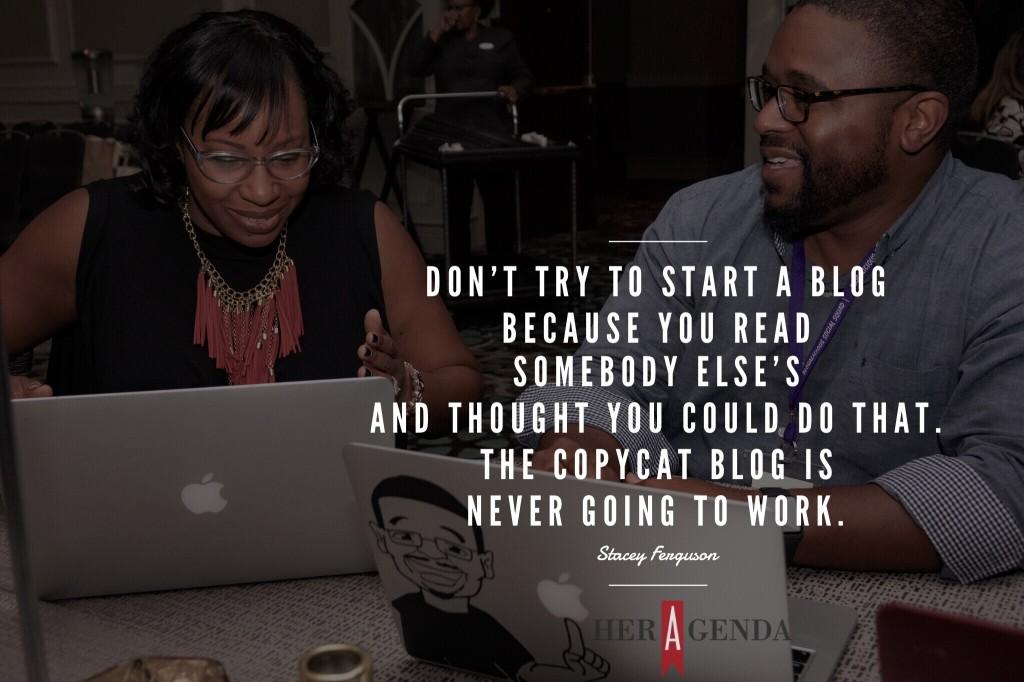
Her Agenda: What would you say is the number one tip for taking advantage of conferences? What are the things you should be doing and how do you connect with people in a way that’s effective?
Stacey Ferguson: Before the conference, 9 times out of 10 the agenda is posted somewhere, you know who’s going to be there, who’s going to be speaking, research them! Read their bios, go to their sites and figure out who they are, read their books if they have one. Figure out who is it that’s going to be there in an official capacity that I can speak to and connect with? Because that will help narrow once you get there. If you come here and there’s 350 people, you’re going to be pulled in eleven different directions because there’s makeup over here, whiskey over here and French fries over there. But you have to be like ‘oh, I know her. I saw her online; she does XYZ, I really need to connect with her,’ that helps [if you] do your pre-research.
Then when you’re at the conference, my rule, personally is three meaningful connections. You can’t meet everyone, and if you meet everyone, it’s literally just ‘here’s my card, what do you do? Okay, bye.’ it’s three days and you want to enjoy the experience, so my rule is if I can walk away with three meaningful connections I know I can make into something, then I’m happy. I feel like it’s worth my ticket and that happens all the time. And I think the three number feels so much more manageable than ‘I need to meet 50 people,’ or collect 30 business cards.
And then the other thing, be intentional. What are your personal goals? And everyone’s is different, so if you’re feeling discouraged and frustrated, maybe your goal is to be reenergized and inspire. But if your goal is ‘I really need to get a client,’ then that’s your goal, then you come and you talk to people and see who can use your services.
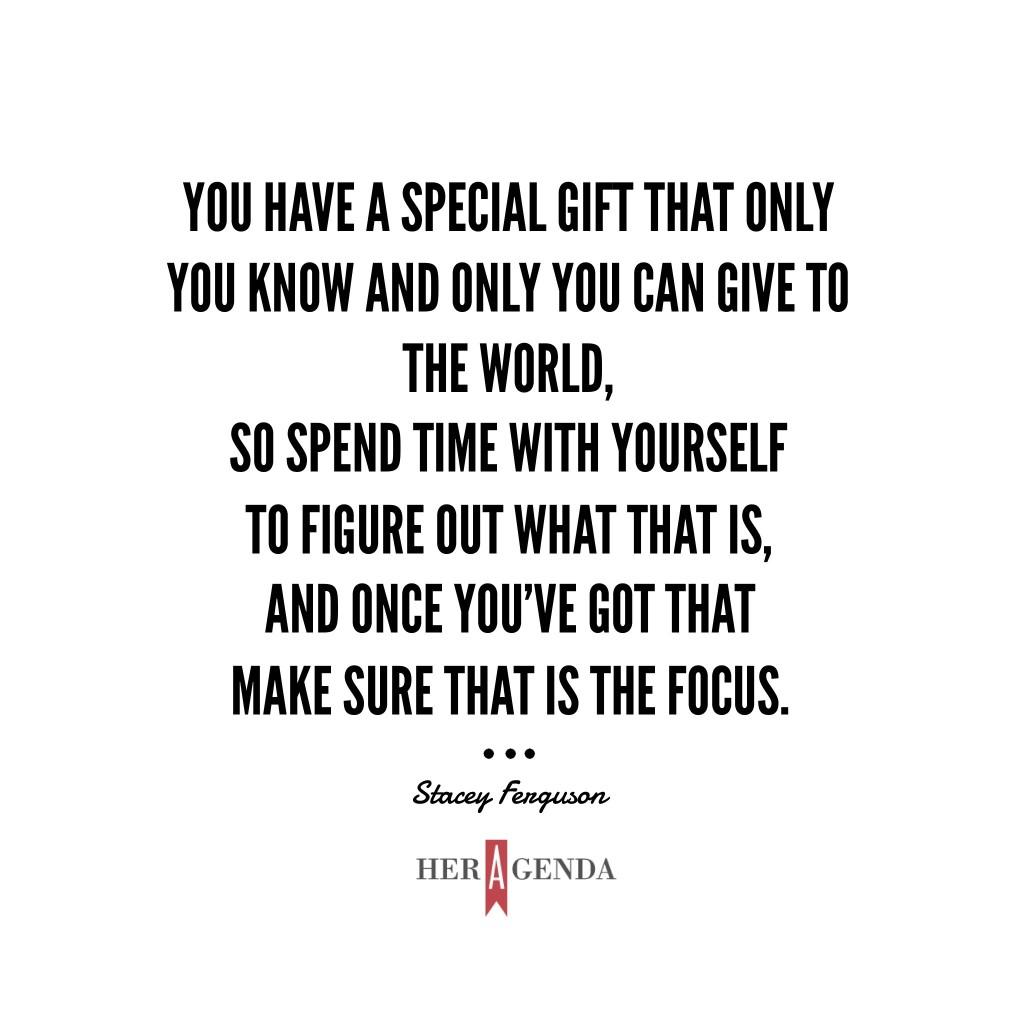
Her Agenda: I wanted to know if you could talk a little bit about the money and the metrics, because I would love to say that Blogalicious conferences have brought in X amount of revenue and reached amount X amount of people. Are you able to expand on that?
Stacey Ferguson: Generally we’ve brought in over $2 million in sponsorship revenue, which has been really great. And then honestly, the ticket sales are like 15 percent of the business. So I can tell you a ticket to Blogalicious like a regular blogger ticket is $299, but it costs me $600 per person. I’m already losing, so I have to subsidize with the sponsors because we have to be at a hotel because the brands need space to do what they do. So if I were to do it at like an art gallery, there’s no way they could do all of this without bringing in caterers, without bringing in all kinds of crazy stuff. The hotels allow me to do that. So because I have to it at a hotel, I have to do two things: I have to meet food and beverage minimum, which is usually upwards of $100,000, and I have to meet a minimum room block. So a certain number of guest rooms per night. And if I don’t meet that I have to pay, and I have to sign that I’m going to do these things a year out. It’s always a gamble and I’m always front loading. I have to put down a deposit. So because the conference itself is expensive, and because bloggers are used to not paying for a lot of things, that’s always been a challenge.
Her Agenda: You’ve answered pretty much all of my questions, but I can’t end this conversation without talking about sponsorships. That’s like the number one revenue stream for the conference business model, and I feel like for a lot of bloggers that’s their dream is to get a sponsor. So what is the key to securing your first sponsorship?
Stacey Ferguson: Again, the answer is frustrating, but relationships. For me, people are always like ‘how do you get them?’ I have never cold emailed a sponsor and sent them a deck—it doesn’t work that way. It’s going to events that share the same audience that you do and seeing who’s there and introducing yourself to them, and fostering a relationship with them. And at the same time building up a value proposition. And what I mean by that is, brands don’t care if you’re awesome, they don’t care if your people are great; they care what the return on their investment is. So for example, at the beginning of this conference, at the beginning of this whole process really, each brand here fills out a questionnaire that we ask them ‘what are your goals and how are you measuring success?’ we need KPIs. And then we are measuring everything we do against those to make sure that they can report back to their client. If not enough people are stopping by the booth for whoever, we need to fix that right away on sight. If Kia isn’t collecting enough email addresses, we need to fix that right on sight. And so really, think about what’s special about your audience that can deliver value to a sponsor or a brand, and that’s the brand. And then you have to package it professionally, and follow up and don’t give up. That’s the best advice I can give.
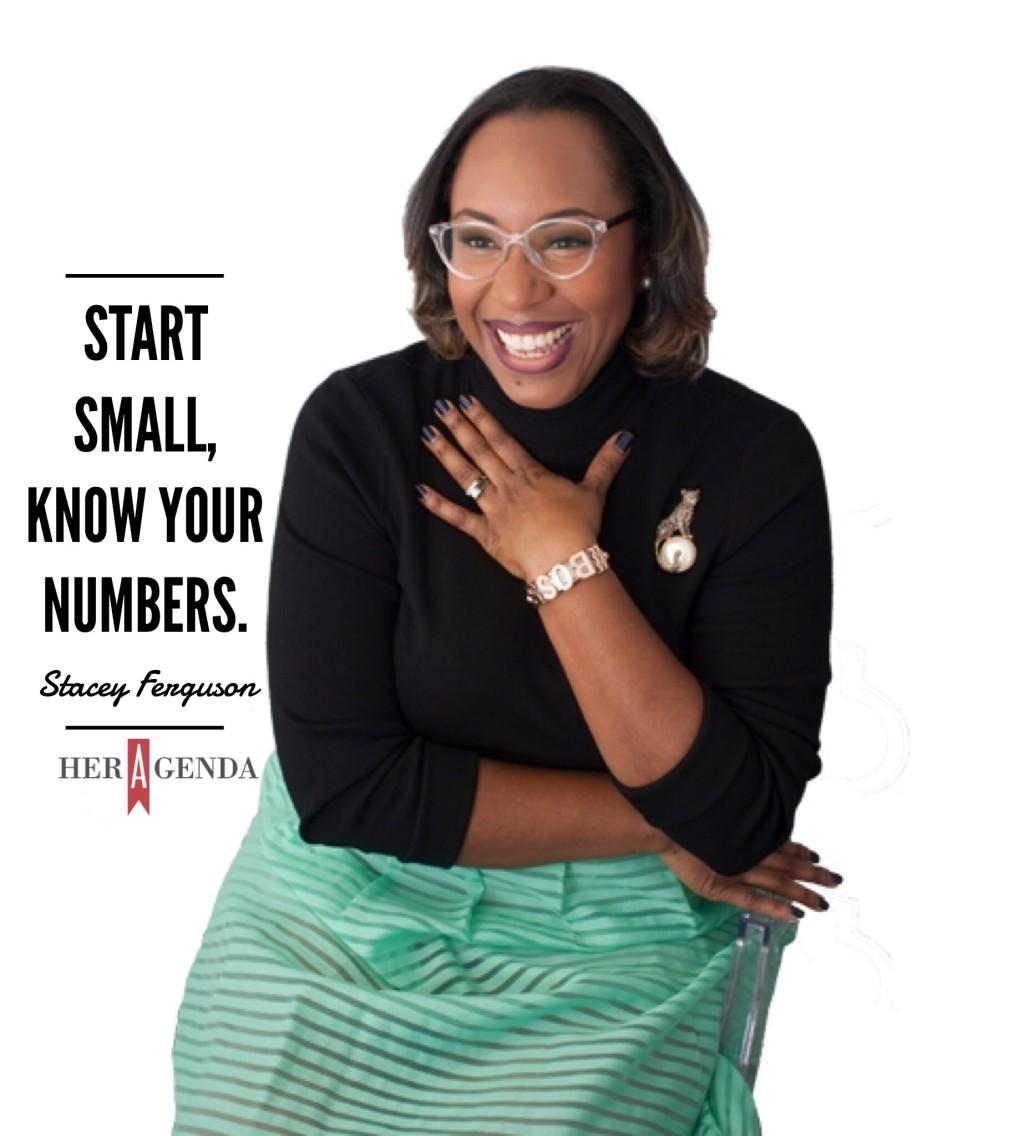
Her Agenda: Also [what you’re doing] requires a lot of faith and thinking big. A lot of people are too practical; they’re like “maybe 100 people will come,” but you’re like “no, 350 are going to come.” So how do you get the mindset of being able to have that faith and think big? Bigger than you probably really like actually believe.
Stacey Ferguson: Believe me, it’s scary every year and this is year [nine]! I never know if anyone’s going to come. I never know if anyone’s going to buy a ticket, but what I have to do is have faith in myself, what I built, my team and the value that I’m providing. Of course you want to make a calculated risk, you don’t want to do something crazy, but you build in small increments. Don’t bite off more than you can chew. We didn’t set out to have our first event with 300 people that would be crazy. So we said if we could get 100 people there that would be amazing. And we didn’t expect to get any sponsors. So we priced our ticket that if we go 100 people there and they paid this ticket price we could pay the hotel. And then we got sponsors, so we were winning because we were budgeting to not, but once we did it was icing on the cake. And once we got more people than we anticipated, whew! Now we can breathe.
So start small, know your numbers. Some people don’t know their numbers, especially when it comes to an event, people ask me for sponsorship help and they’re like ‘I want to get $15,000 in sponsorships,’ and I’m like ‘well why that number?’ and they’re like ‘oh, I don’t know.’ Well, let me see your budget. How much does your venue cost? $10,000. How much does your food cost? $2,000. What are you paying yourself? ‘Oh, I forgot about that.’ You have to pay yourself. How much is marketing? Do you have to pay your speakers? All of that should be in a spreadsheet. Once you have your total event costs, then you can see how much you have to make in sponsorships, and then you go backwards from there.
[Editor’s note: This interview published on October 2, 2017. It has been edited for length and clarity.]









